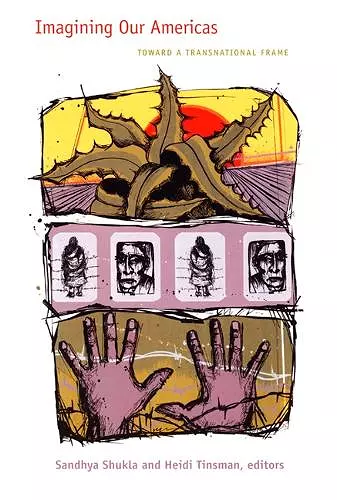Imagining Our Americas
Toward a Transnational Frame
Sandhya Shukla editor Heidi Tinsman editor
Format:Hardback
Publisher:Duke University Press
Published:20th Jul '07
Currently unavailable, and unfortunately no date known when it will be back

Challenges the disciplinary boundaries and the assumptions underlying the fields of Latin American Studies and American/US Studies, demonstrating that the "Americas" is a concept that transcends geographical place
This rich interdisciplinary collection of essays advocates and models a hemispheric approach to the study of the Americas. Taken together, the essays examine North and South America, the Caribbean, and the Pacific as a broad region transcending both national boundaries and the dichotomy between North and South. In the volume’s substantial introduction, the editors, an anthropologist and a historian, explain the need to move beyond the paradigm of U.S. American Studies and Latin American Studies as two distinct fields. They point out the Cold War origins of area studies, and they note how many of the Americas’ most significant social formations have spanned borders if not continents: diverse and complex indigenous societies, European conquest and colonization, African slavery, Enlightenment-based independence movements, mass immigrations, and neoliberal economies.
Scholars of literature, ethnic studies, and regional studies as well as of anthropology and history, the contributors focus on the Americas as a broadly conceived geographic, political, and cultural formation. Among the essays are explorations of the varied histories of African Americans’ presence in Mexican and Chicano communities, the different racial and class meanings that the Colombian musical genre cumbia assumes as it is absorbed across national borders, and the contrasting visions of anticolonial struggle embodied in the writings of two literary giants and national heroes: José Martí of Cuba and José Rizal of the Philippines. One contributor shows how a pidgin-language mixture of Japanese, Hawaiian, and English allowed second-generation Japanese immigrants to critique Hawaii’s plantation labor system as well as Japanese hierarchies of gender, generation, and race. Another examines the troubled history of U.S. gay and lesbian solidarity with the Cuban Revolution. Building on and moving beyond previous scholarship, this collection illuminates the productive intellectual and political lines of inquiry opened by a focus on the Americas.
Contributors. Rachel Adams, Victor Bascara, John D. Blanco, Alyosha Goldstein, Héctor Fernández L’Hoeste, Ian Lekus, Caroline F. Levander, Susan Y. Najita, Rebecca Schreiber, Sandhya Shukla, Harilaos Stecopoulos, Michelle Stephens, Heidi Tinsman, Nick Turse, Rob Wilson
“Sandhya Shukla and Heidi Tinsman have put together a remarkable volume that takes the reader in surprising scholarly directions. The essays stage vital conversations between the Pacific Rim and Latin America through the vector of U. S. empire; between black diaspora and mestizaje through the comparative calculus of race; between queer, feminist histories and Cold War politics in the crucible of the Caribbean. This volume represents the next wave of scholarship in transnational American studies, one in which the coordinates have necessarily shifted beyond the geographical confines of ‘the Americas’ but which is ever-focused on relations of power.”—María Josefina Saldaña-Portillo, author of The Revolutionary Imagination in the Americas and the Age of Development
“This remarkable collection of essays ranges widely across geopolitical regions as well as disciplinary formations, expanding our idea of what the term ‘America’ signifies. It will thus help to shift the ‘transnational frame’ from being merely a hypothetical phenomenon to one that, in the twenty-first century, is coming to appear crucial to any account of American history and culture.”—Paul Giles, author of Virtual Americas: Transnational Fictions and the Transatlantic Imaginary
ISBN: 9780822339502
Dimensions: unknown
Weight: 717g
424 pages